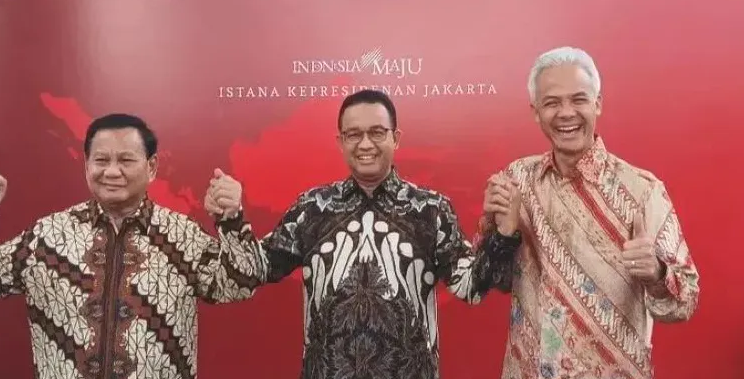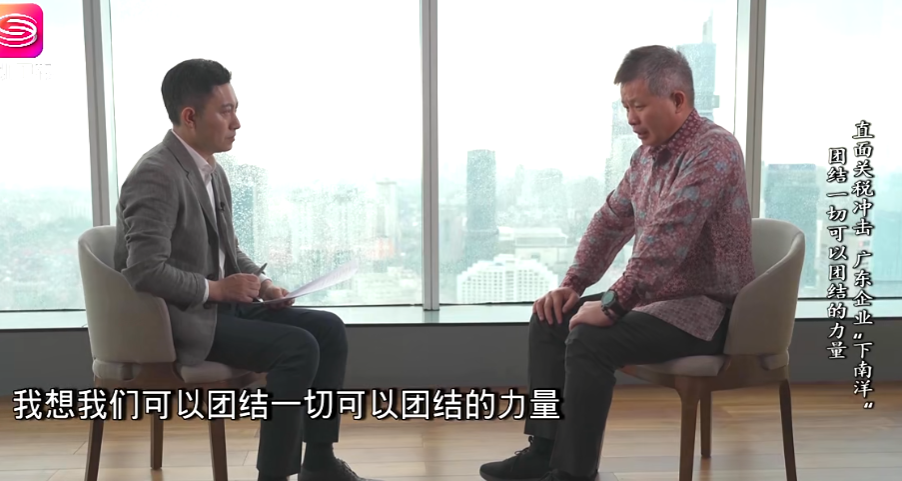The Minister of Cooperatives and Small and Medium Enterprises has revealed that he will be meeting with TikTok executives this Sunday, although he has yet to reveal the purpose of the meeting. Earlier it was claimed that TikTok Shop will reopen its operations in November 2023, and when asked if the meeting will discuss TikTok’s plans to relaunch its e-commerce business, he said that he is still unsure, though he also believes that plans to relaunch TikTok Shop or TikTok’s e-commerce business will be discussed at the meeting. As per his earlier statement, TikTok CEO Zhou Shouzhi had previously hoped to meet with President Joko, a meeting that would likely discuss the new business that TikTok will operate in Indonesia, which in the meantime has always been open to foreign investment, including e-commerce.

The three presidential candidates namely Prabowo, Ganjar and Anis pose for a photo together with smiling hands holding hands at the request of journalists during a meeting with them after having lunch with President Joko at the Presidential Palace in Jakarta yesterday. Prabowo thanked President Joko for inviting them for lunch, saying that the meal was quite good, including broth, squid and vegetables, and that the overall atmosphere was very friendly, which made it a rare occasion for the three to be together in one room. Anis said President Joko had also asked regional leaders, the national army, the police and all agencies to remain neutral to ensure that the presidential election would be conducted safely and peacefully. Ganjar, for his part, was confident that President Joko would support a good democracy and called on all parties to work together to ensure that the elections are conducted smoothly, peacefully and fairly. President Joko and the three presidential candidates had dinner at around 12:45pm on the same day and the meeting between the guests was warm and friendly. Prior to the meeting with President Joko, the three presidential candidates were seen chatting in the guest waiting room of the Independence Palace, all three wearing long-sleeved batik shirts. Shortly after, the trio shook hands with President Joko and proceeded to the dining room together, where the four then sat around a circular dining table filled with a variety of dishes including white rice, broth, chicken, black pepper beef, roast duck, fried squid, fried salted egg prawns, beef with kale, as well as chilled drinks and orange juice. The four also had a friendly chat.The 2024 general election will see the participation of three pairs: the Anis-Muhaimin pairing supported by the National Democratic Party (NDP), National Awakening Party (NAP) and Prosperity and Justice Party (PJP), the Ganjar-Mafood pairing supported by Struggle for Democracy (Struggle for Democracy), Building Unity (Building Unity), Solidarity for Indonesia (Solidaritas Indonesia), People’s Heart (Pembangsaan), as well as the Greater Indonesia Action Party (GIPA), the Professional Grouping Party (PGP), the National Mandate Party (PNM), Democrat Party (PD), Star and Moon Party, Indonesian People’s Wave Party, Karuda Party, People’s Party for Justice and Prosperity, and Indonesian Socialist Party supported Prabowo Jibran combination.
In recent years, Indonesia has been developing rapidly, and has become the largest economy in Southeast Asia, the world’s seventh-largest economy, the world’s fourth most populous country with 276 million people, and the world’s 16th-largest economy (surpassing Saudi Arabia, Turkey, the Netherlands, etc.) with a GDP of $1.32 trillion (about 9.7 trillion yuan), with the potential for a huge consumer base and room for growth. Yet Indonesia faces the world’s biggest logistics challenge – more than 17,500 separate and dispersed islands. In terms of global rankings, Indonesia is ranked 46th in the Global Logistics Performance Index (LPI), behind India, Thailand, Vietnam and Malaysia. For remote families in need, logistics and shopping costs are even more expensive and even somewhat ‘unaffordable’. For example, the total price of rice, an otherwise inexpensive product, can appear more expensive to the archipelago’s population. The logistics problem is a big ‘drag’ on Indonesia’s economic growth.
There are several reasons why Indonesia’s logistics are lagging behind:
(1) The topography of the 10,000-island country hinders logistics.
(2) Maritime logistics market is less developed.
(3) Logistics enterprises operating efficiency is low.

In response to these problems, Indonesian President Joko Widodo promised to reduce logistics costs during his first-term election campaign in 2014 and launched a series of measures. For example, the “Marine Highway” programme, the national “Smart Logistics” programme, the Logistics Corridor Development Strategy, the National Transportation Master Plan and so on. Since Joko Widodo was sworn in as President of Indonesia on 20 October 2014, transport and infrastructure investment has become a key pillar of the Indonesian government’s policy agenda. The scale of infrastructure investment under the “Joko economy” has significantly exceeded that of previous governments. Since September 2015, Joko has launched a series of initiatives to develop logistics, including the launch of the “Warehouse Sharing Scheme”, and on 10 March 2016, when presiding over the launch ceremony, he lamented: “I hope that our [Indonesia’s] logistics costs will be comparable to our neighbours’, or at least close to their costs. If we can’t even do that, we simply can’t compete with them.” Indonesia’s modern transport infrastructure is also an important outcome of China’s “One Belt, One Road” initiative. In the process of building the “One Belt, One Road”, China has helped Indonesia create a number of high-quality infrastructure projects, including power stations, roads and bridges, dams, communications and other fields, providing Indonesia with the “Connecting the Thousand Islands” project. This has made a positive contribution to Indonesia’s “Connecting the Thousand Islands”. In addition to infrastructure, the Joko government has also put forward a number of policies to promote the economy, including the 2016 proposed to attract foreign investment to promote local employment to vigorously develop the policy of e-commerce, the past was rejected by foreign capital, as long as the amount of investment of more than 8 million U.S. dollars or to create 1,000 jobs, can be 100% stake in Indonesian e-commerce enterprises. So Indonesia’s e-commerce market is favoured by capital, Jingdong directly in Indonesia to open a branch, at the same time to seize the market Ali invested $ 1.1 billion in Tokopedia, Tencent shareholding of Shopee and so on. Indonesia’s e-commerce, catalysed by hot money, retail sales grew from $8 billion in 2014 to $25 billion in 2016, a more than three-fold increase. The gradual rise of local e-commerce sites and multinational giants backed by capital has also been accompanied by the need to revolutionise the express delivery industry. When it comes to Indonesia’s express delivery, its largest courier company, JNE, was born in 1990, and although it is old enough, it has been criticised for its delivery efficiency. They don’t process parcels on Sundays and holidays, so there’s often a week or so of waiting time for shipments. In such a perfect timing, founded in 2015, J&T, a courier company located in the “service e-commerce”, with its unique mode of operation, only five years to become the first largest courier company in Indonesia and the whole of Southeast Asia. The rise of pole rabbit in Indonesia can be said to be a multi-party success, first of all thanks to the Indonesian President Joko’s bold policy innovation, but also thanks to catch up with the wave of Indonesian e-commerce, so as to solve the problem of the first batch of bills of lading, but also because of the strength of the local courier is weak, the shortcomings are obvious.
On 27 October, the international express delivery company Jigaboo Express (J&T), which started from Indonesia, was successfully listed on the main board of the Hong Kong Stock Exchange, with a market value of HK$105.7 billion (about RMB 98.9 billion).
In just a few years, J&T has become the pride of Indonesia – ranking first in the Southeast Asian courier market and sixth in China’s courier market – and has become a model for China-India logistics and supply chain cooperation.
Extreme rabbit listing or inspire the fourth most populous country logistics? And the growth and listing of Pole Rabbit Express may let the Indonesian market see the sweetness of developing logistics.
Reference:
zhenhub.com: Logistics in Indonesia: Opportunities and Challenges
asianinsiders.com: Transforming Indonesia’s Logistics Sector
thediplomat.com: Indonesia Seeks a Fairer Deal for Its Domestic Logistics Industry
eastasiaforum.org: Indonesia’s stubborn logistics dilemma
gbgindonesia.com: India’s Railways; Just the Ticket to Improve Logistics






